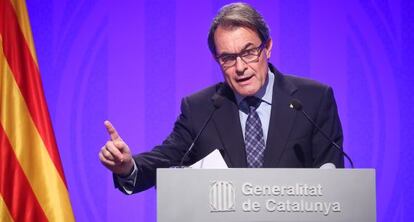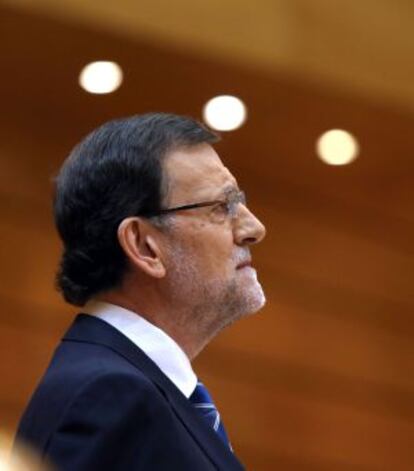Madrid government meddling in Catalan vote case, say state prosecutors
Agencies complain Rajoy administration is urging them to speed up action against Mas

Members of the Attorney General’s Office and Catalan Attorney’s Office are complaining that they are being pressured by the government into speeding up legal action against Catalan officials in connection with the alternative vote on self-rule held in the region on Sunday.
Several prosecutors consulted by EL PAÍS said the Mariano Rajoy administration was “interfering” with their work and “not even bothering to keep up appearances.” They said this left their agencies “in a very bad position” because it gives credence to allegations by the opposition that state attorneys are not independent.
The feeling that the Popular Party (PP) government is one step ahead of state prosecutors only intensified when Alicia Sánchez Camacho, head of the PP’s Catalan branch, announced earlier this week on a TV program that “the complaint against [Catalan premier] Artur Mas and several members of his government for alleged crimes they committed on November 9 is practically ready and has a very solid foundation.”
Sánchez Camacho even specified the crimes that Mas and his aides would likely be charged with: “bribery, misappropriation of funds and disobedience.”
Legal sources said the first charge did not apply to the Sunday vote. “So now Mrs Sánchez Camacho is the Attorney’s Office spokeswoman?” said one prosecutor.
Mas himself has also weighed in, noting that “if the PP and the attorney’s office are one and the same, it’s the end. We are completely unprotected.”
Ever since last week, Prime Minister Rajoy has been under pressure from the more conservative wing of his Popular Party, as well as from the smaller, centralist UPyD and Vox, to go even further in his legal action against the alternative referendum on Catalan self-rule.
These critics say he should have acted on Sunday to stop the vote, which had a participation rate of just over a third of the eligible population, representing over 2.3 million people. But prosecutors refused to carry out demands such as the arrest of Artur Mas, as UPyD requested.
Pressure has been mounting so much that Rajoy has announced an unexpected televised address for later on Wednesday, presumably to explain his position on the matter.
Mas is attributing the upcoming legal complaint against him “to the reigning confusion in Madrid and also to the anger evident in some people; but we are not afraid, because we have a democratic mandate to do what we’re doing.”

The Catalan premier also regretted the fact that the central government seems fixated on legal action rather than political dialogue. “More politics and fewer courts are what is needed,” he said, in reference to the two appeals lodged by the PP before the Constitutional Court to halt the referendum – which was finally held in a much watered-down form on Sunday.
A day after Catalonia successfully held its non-binding ballot, in which 80 percent of voters supported independence, Mas sent Prime Minister Mariano Rajoy a letter requesting “a permanent dialogue” to find a political solution to the crisis created by the independence drive. Catalan authorities are asking Madrid to agree to a new, “British-style” referendum on self-rule for the region that would be official and binding this time.
Mas added that he would also begin a round of negotiations with Catalan parties to discuss the possibility of early elections in the region that would effectively act as a popular plebiscite. If Madrid refuses to discuss the issue of independence, as it has to date, then elections will be the likely choice.
“This is not a threat. But if things don’t work out, we will press forward. It would be better for the other side to realize that it is better to do things in a civilized manner,” reads the letter. “The process will not be halted, regardless of the lack of response.”
Regional elections will only be a choice, however, if Mas manages to bring together all pro-independence parties into a joint list. He has yet to reveal whether he would head such a list himself.
Tu suscripción se está usando en otro dispositivo
¿Quieres añadir otro usuario a tu suscripción?
Si continúas leyendo en este dispositivo, no se podrá leer en el otro.
FlechaTu suscripción se está usando en otro dispositivo y solo puedes acceder a EL PAÍS desde un dispositivo a la vez.
Si quieres compartir tu cuenta, cambia tu suscripción a la modalidad Premium, así podrás añadir otro usuario. Cada uno accederá con su propia cuenta de email, lo que os permitirá personalizar vuestra experiencia en EL PAÍS.
¿Tienes una suscripción de empresa? Accede aquí para contratar más cuentas.
En el caso de no saber quién está usando tu cuenta, te recomendamos cambiar tu contraseña aquí.
Si decides continuar compartiendo tu cuenta, este mensaje se mostrará en tu dispositivo y en el de la otra persona que está usando tu cuenta de forma indefinida, afectando a tu experiencia de lectura. Puedes consultar aquí los términos y condiciones de la suscripción digital.








































